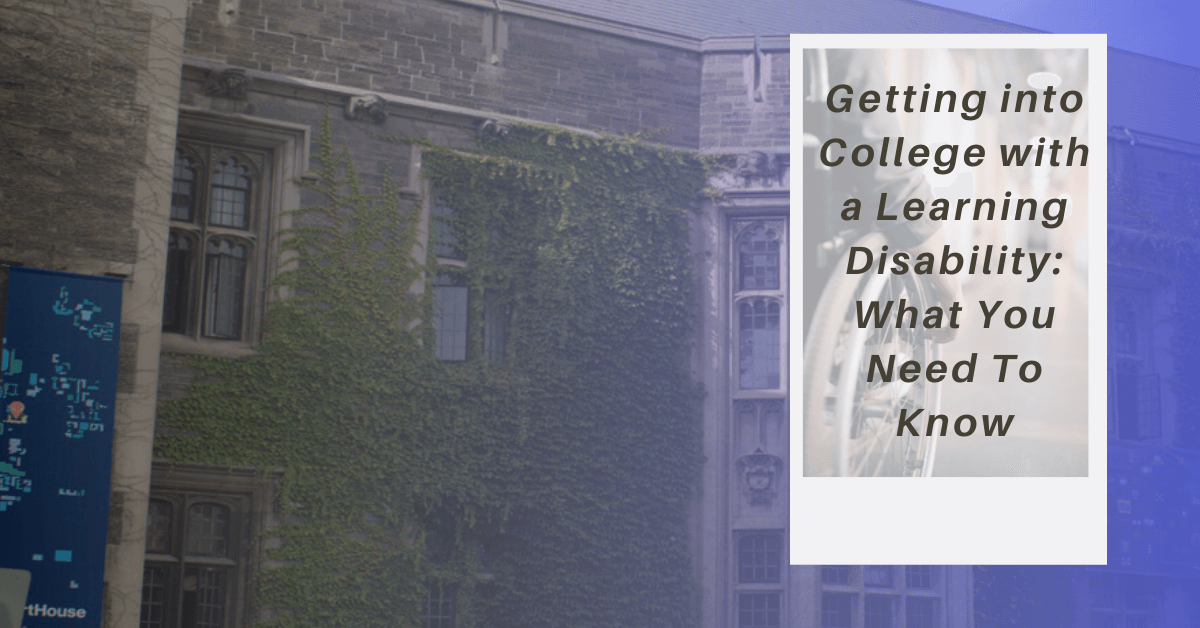Getting into College with a Learning Disability: What You Need To Know
 Getting into college is already a difficult process for any student. All the paperwork, the academic reviewing, the studying for entrance exams, and the general stress of moving to a new environment. All those worries are compounded by the existing obstacles that students with learning disabilities have to face every day.
Getting into college is already a difficult process for any student. All the paperwork, the academic reviewing, the studying for entrance exams, and the general stress of moving to a new environment. All those worries are compounded by the existing obstacles that students with learning disabilities have to face every day.
Today, we’ll be talking about the options available for students with learning disabilities. A lot of universities nowadays offer special accommodations for those who have to deal with learning disabilities. It’s important to make education as convenient and accessible for students because learning is a right that should be possible for everyone.
College Preparation
Start preparing as early as possible to ease the transition from high school to college. Most colleges are very rigorous and for those with learning disabilities, the conventional four-year track won’t work out without proper preparations of what to expect. There are many things to prepare for going to college, such as:
Choosing a College
Colleges will often assess you for a learning disability and ask you in-depth questions about what to expect from their college. If they don’t do this, it’s best to inform them immediately so that they are aware. Certain colleges do have the budget or resources to adjust to a student with a learning disability’s needs.
An admissions advisor will usually be honest about the student’s likely experience and lets you weigh your path moving forward with a college education. Some may even offer grants or scholarships if they still did well in school and are showing an eagerness to learn as efficiently as possible.
Consider Counseling
Certain universities offer in-house counseling or tutoring services to help students with learning disabilities. In the absence of an in-house counselor, parents can look around for a tutor that can assist their children as they go through college. Colleges are informed of this and adjust accordingly. Counseling is great because it ensures the tutor has the majority of their focus on children with learning disabilities, and the proper time is given to their needs.
Legal Rights
Different countries have different laws concerning students with learning disabilities. Review your country’s policies carefully for any laws that could benefit your child. For example, the United States Section 504 of the Rehabilitation Act of 1973 offers protections for students who live with learning disabilities. See if your country offers similar laws as they could ease your child’s transition from high school to college.
Update Your Medical Documents
For all of these to be validated, make sure you have a doctor’s note as well as extensive medical records confirming your child’s learning disability. This ensures that the school as well as the government acknowledges their status, and provides the proper accommodations. Students should be able to do this at an early age so they can feel more independent as well.
Technology And How It Helps With Disabilities
Technology has played a big part in closing the learning gap between those with disabilities and those who do not. These technologies come in all sorts of shapes and sizes, and some examples include:
Grammar Checkers
For people living with dyslexia or ADHD, grammar and spelling mistakes tend to be prevalent. Grammar and spell checkers are incredibly useful tools in that regard. They automatically offer ways to solve all the issues of a paper in real-time. For those who have difficulty reviewing large walls of text, grammar checkers are crucial for ensuring high-quality output.
Alternative Keyboards
These special keyboards have built-in customizability to fit your child’s needs. Students who have trouble with typing are likely to benefit from this tool. Reducing input choices, adding clear graphics, as well as distinct lights to label keys, are some of the features offered by alternative keyboards.
Graphic Organizers
Keeping things organized is difficult for those with learning disabilities, and graphic organizers fix that problem. Their interface allows for an accessible way for students to organize the information they have learned. It also lets them study much easier, and look for information they need quickly.
Speech to Text
For students who struggle with writing or typing due to a disability, a speech-to-text tool is very useful. It lets them exercise their oral skills while at the same time inputting their words onto text for future reference. This is very useful in conjunction with recording lessons as well.
Conclusion
For students planning their careers, a college education is a great asset to get them started on the right track. The education sector has been much better about accommodating the needs of students than they were 20 years ago.
Even in the absence of that, technology has progressed to a point that disabilities are much easier to live with than it was before. Getting into college as a student with a learning disability may be difficult, but most certainly not impossible.

